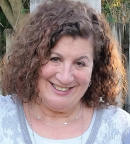In 1997, just 6 weeks after giving birth to my second child, I started having fevers and night sweats and my lymph nodes were swollen. I’m a physician, so I knew something was wrong and that my symptoms were unrelated to having just given birth. I had a blood test, and a biopsy was performed on one of my enlarged lymph nodes, which tested negative for cancer.
Because the blood test was positive for antinuclear antibodies, I was diagnosed with lupus and treated aggressively with anti-inflammatory drugs and steroids. Despite the treatment, I kept getting sicker. The rheumatologist treating me said that I had the worst case of lupus he had ever seen and continued to prescribe medication for the autoimmune disorder.
Still, I wasn’t getting any better. In fact, I began having new problems with stomach pain and nausea. Finally, a gastroenterologist performed an endoscopy procedure and biopsied my stomach tissue. The pathology report came back positive for non-Hodgkin lymphoma. By then, I had been misdiagnosed and incorrectly treated for 5 months.
Facing Permanent Disability
I was prescribed R-CHOP (rituximab [Rituxan], cyclophosphamide, doxorubicin, vincristine, and prednisone), the standard treatment for non-Hodgkin lymphoma, but by that time, I was so physically debilitated, I lapsed into acute respiratory distress syndrome after the first round of the regimen and had to be intubated for a week. I thought there was a chance I could die.
Once my lungs began functioning normally again and I was able to come off the respirator, I resumed my chemotherapy treatment. After the third or fourth cycle, however, I began experiencing such severe symptoms of chemotherapy-induced peripheral neuropathy in my legs, my oncologist replaced one of the drugs—vincristine—with nitrogen mustard.
Although the symptoms in my right leg resolved after the adjustment in chemotherapies, the nerve damage in my left leg never improved. Even now, 18 years after my lymphoma diagnosis, the neuropathic pain remains so severe, I need medication every day just to perform routine functions without help.
Overregulating Opioid Use
I’m grateful that my non-Hodgkin lymphoma has remained in remission since my diagnosis in 1998, that the cancer didn’t take my life, and that I was able to raise my two young sons. However, having cancer did rob me of a profession I loved. At the time of my diagnosis, I had a thriving practice in internal medicine. I was just 37 years old and at the top of my professional game. Being a doctor gave me an identity I had worked hard to achieve, and in an instant, it was gone. All these years later, I’m still struggling to find my place in the world.
Compounding my struggle is the fact that there are such strict guidelines now on the use of opioid pain medications, I’m made to feel like a drug abuser every time I get my opioid prescription filled to ease the neuropathic pain in my leg. I understand that regulation is necessary to crackdown on medication abuse, but the regulations are so severe even for documented legitimate use, they require me to see my prescribing physician once a month for a new prescription and to be monitored for drug compliance.
The process is a constant source of stress. Adding to my distress is the fact that I’m made to feel ashamed about taking a medication that is as life-sustaining for me as any medication used to treat people with other chronic illnesses like diabetes or heart disease.
Living With the Effects of Cancer
Looking back, I think being a physician worked both to my advantage and disadvantage when I got my cancer diagnosis. It absolutely helped that I had a medical background and could understand my diagnosis and the treatment plan my oncologist was recommending, and I certainly received excellent care. But I also think that because I had an MD after my name, my health-care team assumed that I was better prepared than other patients for the physical and emotional onslaught of having cancer. I wasn’t. And yet, I was never offered referrals for psychosocial services that could have improved my quality of life.
Also, no one on my oncology team ever prepared me for what to expect after my non-Hodgkin lymphoma was successful treated. So the permanent nerve damage in my leg and the ongoing cognitive difficulties from the chemotherapy came as a surprise and are conditions that I now contend with daily.
Forging a New Life
Today, I’m at a turning point in my life. My two sons are in college, and I’m trying to figure out how I can best fulfill my passion for medicine, even if I can no longer treat patients. After I gave up my medical practice, I enjoyed teaching physical examination skills, so that might become my new profession.
My challenge now is to find a new professional identity that can be as satisfying as medicine. I’m not yet sure about my place in the world, but I’m glad to have the chance to figure it out. ■
Dr Berenfeld lives in a suburb of Charlotte, North Carolina.


